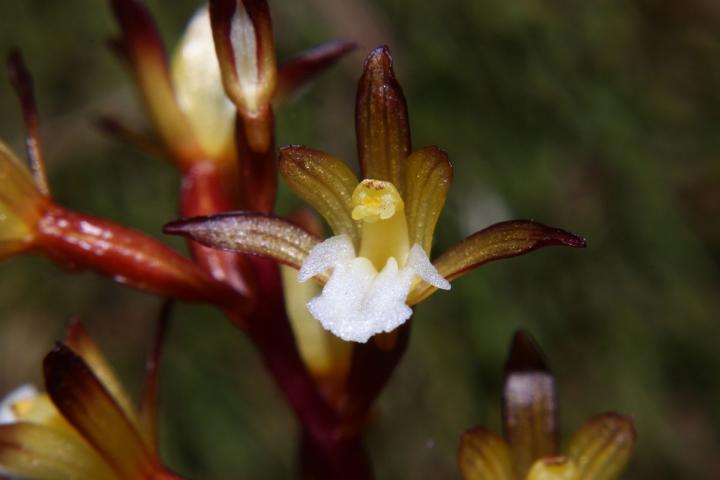
Credit: Craig Barrett
A West Virginia University biologist is working to cultivate a bumper crop of young scientists through the study of wild orchids – and the fungi they eat.
As WVU’s latest National Science Foundation CAREER Award recipient, Assistant Professor of Biology Craig Barrett is teaming up with teachers in rural West Virginia high schools to develop student-led research projects. The projects will culminate in lesson plans accessible to high school students and teachers across the U.S., with an emphasis on closing the STEM skills and interest gap in the Mountain State.
The projects will use parasitic orchids to study genomics, in particular how genomes evolve across space and time.
“Students from Appalachia, including rural West Virginia, are still underrepresented in STEM careers. West Virginia’s economy has been changing, with many industries that once provided stable jobs leaving the region,” Barrett said. “STEM careers, including education, medicine, agriculture, forestry, biotechnology and alternative energy, represent more stable career paths and hold great potential to provide employment opportunities in the region for future generations.”
While most plants obtain food though photosynthesis, parasitic orchids cannot manufacture their own food from sunlight. Instead, they seek out nutrition from other sources – in this case, fungi. Barrett has dedicated his career to studying these orchids, with more than seven published works.
“Through evolution, these organisms have undergone radical lifestyle changes, including the loss of leaves, chlorophyll and even roots,” Barrett said. “They feed exclusively on fungi, which is the opposite of how we think of plant-fungal interactions. The orchids often prefer certain types of fungi. They are very picky eaters.”
Orchids are an ideal model to study the evolution of genomes because, with more than 20,000 species, they are among the most diverse plant families to have ever lived on Earth. More than 50 species are found in West Virginia, making the state a hotbed for these plants in the eastern United States.
“Orchids have evolved this type of parasitic relationship with fungi more than 30 times on independent evolutionary lines, with more than 200 leafless species worldwide. Each one of these major transitions is like a different case study, and taken as a whole, they are extremely powerful,” Barrett said. “That makes orchids the ideal system in which to study genomic consequences of such radical lifestyle changes.”
WVU faculty, undergraduates, high school students and teachers will create and implement two-week, experiential lesson plans in genomics and bioinformatics. Students will choose their own research projects based on a set of guiding questions focused on local parasitic orchids in West Virginia. WVU students will conduct the laboratory experiments while the high school students will develop hypotheses, analyze data and interpret results of their individual projects.
“Through a highly collaborative effort, we will conduct these activities using tutorials that anyone can follow in the classroom or at home,” Barrett said. “They will be shared through various teacher resource channels and publicly via social media.”
This research also aspires to make orchids more sustainable. Orchids are a multibillion-dollar industry as decorations and crops. Vanilla, for example, is an orchid. While commonly seen orchids, like those sold in grocery stores, are grown without the need for fungi to germinate their seeds, most orchid species can’t be grown that way.
“We hope that increasing our knowledge of the requirements for fungal germination and survival will open many new possibilities to grow more orchid species,” Barrett said. “More importantly, many orchids are threatened or endangered, facing risk of extinction. Such knowledge of their host fungi will help with conservation efforts in a rapidly changing world.”
###
The $800,805 CAREER award will be dispersed over five years.
To learn more about Barrett’s research, education and outreach activities, contact him at [email protected] or at 304-293-7506.
-WVU-
ks/04/07/2021
Media Contact
Katlin Swisher, Eberly College of Arts and Sciences
[email protected]




